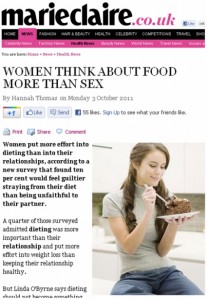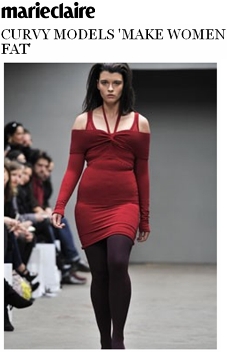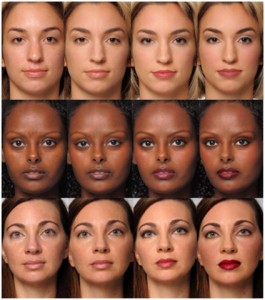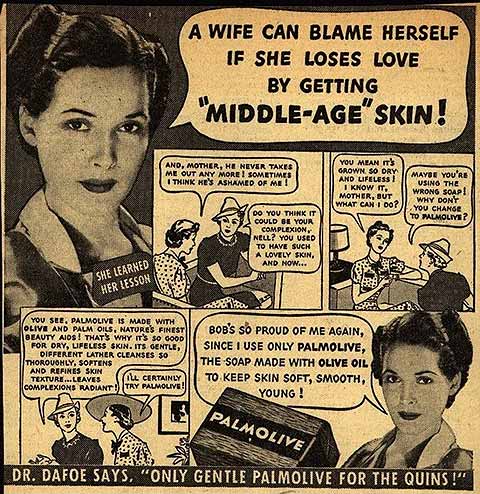Three words for 2012: you are beautiful
This past Monday, I asked readers to peruse the archives and choose a post from the year that resonated most with them. My goal was to pay forward some of my good fortune and gratitude, not only for an audience who returns to learn and share about the trials and tribulations of aging and being a woman, but also, to give thanks for the ability to help someone who has not been so fortunate. Margaret Chaivez commented that this post from April of this year, one in which I responded to a reader who called me an ‘old bag,’ spoke to her, adding that she has “realized that make up and clothes can help me morph into something folks like Jimbo may appreciate. Yet without the confidence and self awareness, it means nothing.”
As women, we are often expected to live up to an ideal that is either unrealistic or unreal. And yet, the pressure that is placed on us to do so often comes from within. Ironically, the title ‘menopause’ has caused a lot of women to turn away from Flashfree, not realizing that the time to start embracing is earlier than the ‘pause, and the time to start preparing is the same.
I want to thank Margaret for taking the plunge and having the courage to embrace her beautiful self. And mostly? For helping me help others.
Happy New Year!
Are you an ‘old bag?’
Evidently if you are over 40, you are at risk of becoming one, especially if you are not ‘nice to men.’
I was struck and a bit stunned by a reader comment that I received this week. The comment was in response to a post about the Cougar Convention, and made a point to denigrate women as much as possible.
This is what Jimbo wrote:
Yes, most all women are desparate. Look how they dress. Look at the makeup. Look at what they show off. It is obvious. They are desparate for sexual attention. Yet, they want the attention as if they are in control and giving themselves as a gift. This is a none truth. Women need to get real and look at themselves and their own behavior. They are desparate for sex and men.
When women get to be 40+, they start to get honest. Heck, there is not much time left to pretend. They need to find a man and be real nice to him before they turn into old bags.
A number of readers have responded to Jimbo’s comment, obviously taking offense. I chose to leave Jimbo’s comment up up for the very reason that I don’t censor; afterall, Jimbo is entitled to his opinion. However, I would like to leave Jimbo with this:
Jimbo –
40 year-old+ women are sexy, beautiful and self-assured. They have lived long enough to have gained the wisdom to allow them to feel comfortable in their bodies. And have a tendency to embrace who they are, sometimes even more than their younger peers. Nevertheless, in all fairness, you responded to a post entitled “Pimp your hide,” in which I referred to certain women attending a convention that encourages them to use their sexuality to attract a younger man. This however, is the exception and not the rule; the majority of women I know do not have fake boobs or plumped lips and have not done liposuction. While many color their hair (present company included), don’t be surprised if you find them out and about without makeup or wearing jeans and a tee shirt. Or better yet, out with men their age or older. Yes, Jimbo, women don’t always ‘dress to kill.’
So, Jimbo, I’d like you to see what a soon-to-be 49 year-old looks like – at the gym and home, with or without make-up. I can assure you; I am not an old bag nor do I ever intend to be one.
What does your 40+ look like? Comment or send me a photo and I’ll post! Let’s make Jimbo eat his words.
Read MoreWednesday Bubble: Should Fatties Get a Room…and Other ‘Fine’ Assaults on Women… Guest Post by Dr. Brian Hughes
My friend Dr. Brian Hughes is at it again. “At what,” you ask? At identifying media assaults on women, on aging and on identities. You may recall that I ran Brian’s piece on ageism back in July of this year. And I am honored to run another post. Once again, I hope that you’ll show Brian some love and spread the word, not only about the post but also his work on The Science Bit Blog. Many thanks Brian!
I don’t know much about Marie Claire, but it appears to be some sort of magazine/website for people who hate women. At least, that’s the conclusion I drew from reading this story in their UK edition’s Health News section: “Women Think About Food More Than Sex“. In genre terms, this is something of a high concept piece, one of those articles that sums up everything it has to offer within the phrasing of its title alone (a bit like “Snakes on a Plane“).
So what did they find? Firstly, a full 25% of women ”admitted” that dieting was more important to them than their intimate relationships. In fact, get this:
…ten per cent would feel guiltier straying from their diet than being unfaithful to their partner.
That’s right. Marital (or relationship) infidelity — the stuff of epic romantic drama at least since the mythology of the ancient Greeks — is actually not that significant after all. What matters more is diet adherence. So, while Hester Prynne appeared somewhat perturbed throughout The Scarlet Letter, at least all she had to deal with was the stigma of her sexual indiscretion. Imagine if the townsfolk found out about that extra chocolate biscuit she used to scoff during coffee breaks…
Here are some more findings:
The most common reason for women in the UK to start a diet is to get the perfect beach body–while one in seven say cruel taunts are the reason they reign [sic] in their eating.
So women become self-conscious about their bodies due to beach paranoia andtaunting, eh? Well I guess that has nothing at all to do with articles appearing in magazines. Magazines like Marie Claire, for example…
How about these delightful pieces: “Are Leggings Making You Fat?“; “Could Your Fridge Be Making You Fat?“; “Curvy Models ‘Make Women Fat’“; “Diets That Make You Fat“; “Healthy Foods That Make You Fat“; “Is Your Air Conditioner Making You Fat?“; “Can A Common Virus Really Make You Fat?“; “3 Surprising Things That Make You Fat” (stilettos, your partner’s education, and boredom, apparently); “3 Fats That Make You Skinny” (ooh-er, now I’m confused); “10 Best Celebrity Beach Bodies“; ”From Flab To Fab: Your Holiday Survival Guide“; and “Get A Beach Body Fast“.
Uh huh. No grounds for paranoia or for beach-body neurosis there at all.
And as for cruel taunts, how about this memorable Marie Claire column called ”Should ‘Fatties’ Get A Room?“ Here’s an excerpt:
So anyway yes, I think I’d be grossed out if I had to watch two characters with rolls and rolls of fat kissing each other…because I’d be grossed out if I had to watch them doing anything. To be brutally honest, even in real life, I find it aesthetically displeasing to watch a very, very fat person simply walk across a room…
I think I understand why “one in seven (UK) women” modify their eating due to “cruel taunts“. They are obviously Marie Claire readers.
Still, while all that looks pretty terrible and offensive, at least Marie Claire quote a nutritionist to advise readers that “Dieting should never become an obsession“. So that’s alright then. Hands washed.
As it happens, “women think about food more than sex” is a well phrased, nicely falsifiable hypothesis. Either it is true or it is not. All that we need is data from a sample of women that is both large and statistically representative of the general population, regarding (a) the extent to which they think about food and (b) the extent to which they think about sex. Then we can do a simple statistical test tocompare these two values in order to determine which subject, on average, is thought about the most.
But of course, that’s not what we get here. Instead we have a pretty standard population-based survey study, with minimalist description of methodological details. Marie Claire report the findings as “Health News“, presenting statistical factoids that imply a basis in a comprehensive dataset but avoiding anything as troublesome as even a sample size.
In fact, according to the UK Press Association, the study examined responses from over 1,200 women, which sounds comprehensive enough. However, we are not told what questions were asked or what other findings the researchers discovered. This is because the study is not actually a piece of formal science. Rather, it’s a bog standard market research survey conducted by a private company who have a commercially vested interest in reporting particular results.
The survey is brought to us by Atkins, the people who make a profit every time a woman buys one of their dieting products. They seem to churn out lots of this type of research (see here, here, and here), all of which goes directly to newswires and yields findings that encourage women to turn dieting into an obsession. And thatnutritionist that Marie Claire get to warn women not to turn dieting into an obsession? Yeah, well she works for Atkins. In fact, she’s their “Chief Nutritionist“.
 Guess which one of these corporate value statements is my favourite
Guess which one of these corporate value statements is my favouriteWe’ve been here before. Pseudoscience in the service of corporate greed is depressing enough on its own. But it is truly amazing how women’s magazines and media outlets become complicit in this baloney. Instead of providing a service that is of actual benefit to women, these magazines end up assisting a corporate marketing strategy designed to maximize profits by generating and exploiting reader confusion.
Hey, for all I know (and I don’t), women might well think more about food than about sex. But let’s just remember this. Women’s magazines think more about their profitable relationships with corporate advertisers than about the edification — or mental health — of their readers.
Yeah! Go women!
About the author…
Dr Brian Hughes is a lecturer in Psychology at the National University of Ireland, Galway and author of Conceptual and Historical Issues in Psychology (Prentice Hall, 2011). When he is not writing or lecturing, you can find him lending his views on Twitter.
Read MoreMakeup ‘makes’ the woman?
Can’t make this one up.
Pardon the pun but the results of this particular study, published last week in PLOS One, deserves some attention, not because it conveys a positive message but because it challenges me I know at the cellular level by confirming that as humans, we often focus on the wrong attributes. And in no gender is this truer than in women, who are often judged for what’s on the surface rather than what lies within.
Two studies conducted by Harvard Researcher and Assistant Clinical Professor at Harvard, Nancy Etcoff, PhD, were developed to examine how adorning a face with colour cosmetics affects how other individuals will respond. These studies were seen as a natural extension of prior research that has shown that facial beauty influences first impressions and increases beliefs that the beautiful are more socially skilled, confident, successful and even more competent.
A bit of background…
Cosmetics have had a long history of controversy and shifting cultural mores. For example, in the 10,000 BC, cosmetics were used by both Egyptian men and women to enhance their spirituality and stature. In the late 18th Century, cosmetics (along with perfumes, scented water/washes and “paints”) were banned from being used to snare a husband. Thereafter in the Victorian Era, there was a return to the natural look and the fragility of women and cosmetic enhancement was frowned upon. In more modern times and we’ve gone from painting the town red in the 1920s to au natural in the 40s back to glamour in the 50s and a return to au natural in the 70s. Today, the researchers write, “cosmetics are seen as freely chosen and morally neutral agents of beauty enhancement…reflecting the individual’s preferences and choices, and the response to their use reflects” the perceiver’s ideas about makeup use and what is says about a person’s personality, intentions and character. In other words, how you look still influences what others’ think and feel about you.
The research
Etcoff’s research findings take us one step further towards substantiating that as a culture, our priorities are seriously askew. In it, she and her colleagues asked over 200 men and women to rate the same 25 female faces (Hispanic, Caucasian or African American models) with our without color cosmetics and wearing various degrees of makeup (minimal to moderate to dramatic or more specifically, ‘natural,’ ‘professional,’ or ‘glamourous’ looks). The models were rated for attractiveness, likability, trustworthiness and competence on a 7 point scale (ranging from not at all to highly/extremely).
[Photo: doi:10.1371/journal.pone.0025656.g001]
The researchers found that when the models’ were viewed for only 250 milliseconds, makeup increased ratings of their attractiveness, likability and trust. When viewers had more time to look at the faces, only the natural and professional make up looks increased the degree to which the models were perceived as likable, professional, competent and trustworthy. Still when the researchers contrasted the glamorous look to no make up at all, the found that viewers rated the models as likable, competent and significantly more attractive; only trustworthiness was questioned.
Overall, the findings show that increased beauty can be equated with increase social power and competence and to a lesser extent, how warmly someone is perceived. And researchers say that “attractiveness has assumed increasing significance [in our culture] and wil continue to do so as long as beauty remains an unconscious proxy for status and ability.”
Proctor and Gamble’s Principal Scientist of Color Cosmetics takes this even one step further, claiming, in a related press release that “makeup is a real life tool in [the female arsenal that allows women] to effectively control the way they want to be — and are — perceived.” The message? Makeup is king in a manipulator’s toolbox. And in order to take control and be in control, women need to manipulate their image.
What happens when that image is taken away from them and they are “found out?” And truly, what messages are we sending?
The other day I ran across a trailer for Miss Representation, a documentary about how women and girls are perceived our culture and how these views are influenced by the media. I would like to suggest that perhaps, we are both the influencers and the influenced.
I guess it comes down to this one question:
What makes the woman? It’s up to all of us to decide.
Read More
Wednesday Bubble: Anti Anti-Aging, Pro Great Glow. Guest post by D. A. Wolf
You know when you read something and you say “wow,” wish I had written this? This is how I felt when I read this piece on aging (or anti-aging) by freelance writer and journalist D. A. Wolf. And although I had never spoken to her before, I reached out on Twitter and asked her if I could run it on Flashfree.
We’re bursting some big bubbles today, the type that convince us that aging is a four-letter word. And it’s never a better time to remind ourselves that this line of thinking couldn’t be further than the truth.
Enjoy!
I thought it was the usual – a skinnied-down version of a new magazine in a world gone virtual. Daring, I thought – attempting any sort of print publication in this age of the Internet. So I set aside the bills from the mailbox, and sat down instead to page through.
I hadn’t recognized the woman on the cover. Only after reading the table of contents did I glance back and scrutinize the face, discovering an 80s icon in the plumped, smoothed, and limpid likeness.
I won’t say who it was; I will say I was disappointed. The person gazing back at me seemed pleasant enough, somewhere in that tinkered-with range of 40 to 60, yet she spun no stories and held only the slightest resemblance to the woman I once watched and listened to.
I skimmed the lead article, and thumbed through the rest.
Hmm, I thought. A lot of sponsored copy.
Then I realized it was nearly all sponsored: lasik from my local clinic, Botox from the dermatologist in the nearby office park, full-fledged nips and tucks or, mini-lifts if you prefer.
A vibrant smile?
Not a problem. There were befores and afters from at least a half dozen providers of dental implants or pearly veneers.
Concierge-assisted recoveries?
Many to choose from.
There were case studies on European creams, on heart healthy diets, on the advantages of the now-accepting-new-members senior spa and health club. There were pictures and paragraphs on every conceivable cosmetic procedure.
I paged back to see the name of the publisher and more about the contributing writers. This thinly veiled advertising circular was little more than a targeted set of “senior services,” all of which were spouting the advantages of anti-aging this, anti-aging that.
Which is when it hit me, which isn’t to say it hasn’t occurred to me previously.
Anti-aging? Wouldn’t that mean death?
Shouldn’t we be pro keeping our eyes and ears open and making reasoned choices, including rejecting the concept that we must always appear young? Why is every sign of aging “bad?”
- Why are my joyful laugh lines to be expunged?
- Why must my abdomen reject the ripples that show I carried babies?
- Why is aging – especially as a woman – so sorrowful that we feel “less” than worthy of love, worthy of jobs, worthy as people?
Why had this lovely 80s star allowed her individuality to be cosmetically and digitally altered?
I may not like the loosening of skin in all its inevitable places, but isn’t that natural and not without its own beauty? Is it impossible for us to appreciate the entirety of the package, rather than pointing to the shiniest wrapping and saying that is all that matters? Can’t we focus on health and its obvious advantages?
Of course I’m aware of ageist prejudice.
Of course I’m aware of my lessening marketability.
But doesn’t accepting the prevailing “wisdom” of fighting aging tooth and nail mean condoning that we are valueless as we mature?
I try to eat well, I walk when I can, I paint my gray, and I love to dress in a feminine fashion. I put on my mascara and gloss, and God knows I adore my shoes. I won’t say “never” to the possibility of a tweak someday, but nor will I apologize for my age, and with it – my acquired wisdom, my sexual maturity, and my stubborn vitality.
And I won’t be told that “aging” is anything other than natural.
Maybe it’s time we shifted our thinking, we the women of 40 and 50 and 60 and older – and rather than fighting our years, fight for them. So give me Meryl and give me Helen. Let’s toot our handsome horns and flaunt our fabulous fuller figures, knowing that great glow is more than show, and not the entitlement of a single demographic.
About the author…
D. A. Wolf is a freelance writer, journalist, marketer, trainer, single parent, art collector, polyglot, traveler, and devotee of exquisite footwear & French lingerie. She believes we are all brimming with glorious contradictions, and capable of living fully – with whatever life dishes out, and whatever we can make of it. You can find a lot more of D. A. and her brilliant self at her blog, Daily Plate of Crazy.
Read More
Losing love? Must be your appearance…
I love it when I run across these. Here’s another great vintage pharmaceutical ad, this time on middle aged skin. What amazes me is that it raises the issue about advertising and pushing the youthful ‘agenda;’ seems that it’s been building for decades. And speaking of body image, an oldie but goodie. What would you give up for perfection?
What would you trade to reach what you considered your ideal body weight and image? How much would you sacrifice?
The question seems absurd doesn’t it? However, researchers from the University of West England, in partnership with The Succeed Foundation, that body image is a major issue for women of all ages.
Although this survey of 320 women mostly comprised university-aged women, the breakdown did skew as high as 65 years. Moreover, the majority were of normal (i.e. BMI 18.5 to 24.9) weight.
Of all the women surveyed, 93% said that they had had negative thoughts about their appearance and nearly a third, several times daily. Approximately 80% said they would like to lose weight, even though about 78% were of normal weight or underweight. What’s more, the women said that on average, they would like to lose about 16 pounds. However, most importantly, 30% of women said that they would trade at least a year of their lives to achieve their ideal body shape and weight.
Other sacrifices to achieve the ideal included:
- losing over $8,000 from their annual salary
- giving up time with their partner
- forgoing a promotion at work.
Numerous studies and reviews have documented the association between age and body image but have mostly focused on adolescents and teens. In recent years, more and more reports are emerging that demonstrate that eating disorders and issues with body issues is not necessarily age-centric.
There’s no doubt that images of young models dressed and made up to look like women and airbrushed celebrities the permeate the media scape have contributed to if not exacerbated the problem. However, what is it the makes women consistently strive for an unreasonable ideal throughout their lifetimes, so much so that they are willing to sacrifice basic necessities and relationships to achieve this goal?
As women, we’ve come very far. But clearly, many of us clearly continue to give their power away when it comes to self-image, self-esteem, achievement in the workplace and even in our relationships. This study is a wake-up call, not only to our generation but to generations of women who are following in our footsteps.
So tell me, what would you sacrifice to achieve the idea?
Read More














